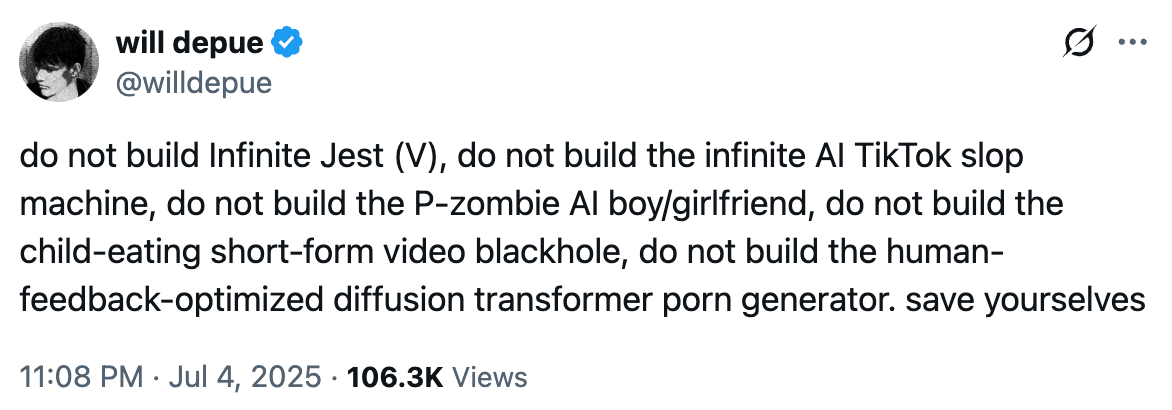Infinite Jest
What if dopamine is the Great Filter?
Way back in 1950, Enrico Fermi asked, "Where is everybody?" We had good telescopes by then, and we had started using radio astronomy too. Space was huge.. and yet, it seemed empty. There was nobody else there. The reasoning went something like this:
There are billions of stars in the Milky Way similar to the Sun.
Some of these stars have Earth-like planets orbiting in the habitable zone.
Some of these planets may have developed intelligent life long ago.
Some of these civilizations may have developed interstellar travel.
Even at the very slow pace of envisioned interstellar travel, the Milky Way galaxy could be completely traversed in a few million years.
Since many of these stars are billions of years older than the Sun, the Earth should have already been visited by extraterrestrial civilizations, or at least their probes.
However, there is no convincing evidence that this has happened.
This is the Fermi Paradox. There have been lots of proposed solutions. Frank Drake built the Drake Equation to codify all of the different galactic probabilities that make up the Fermi paradox. At least one of them must be pretty rare. Sun-like stars are common, but maybe planets are much rarer than we think? Maybe very few are in the habitable zone? Maybe life is common but intelligent life is incredibly rare? Or maybe nobody actually gets out of their own solar system?
That last one presents all sorts of possible explanations. It's the idea that there's some Great Filter that stops most civilizations in its tracks. There's some incredibly improbable step that needs to be surmounted to move out into space. Maybe it's multicellular life, or maybe it's intelligence.
Or maybe it's something that's still out in front of us.
Dr. Alice Evans is one of the scientists documenting the global fertility crisis. Nearly all developed countries are now below the replacement rate. South Korea is below 1 child per woman, a shockingly low number. Children there are becoming a rare sight in public and parents get tons of benefits in an effort to turn things around.
Alice Evans is tracking not just less babies, but also less relationships, which she calls The Coupling Crisis. She tracks some of the cultural changes that have this happening in different regional areas. Grooms don't respect their brides. Women have become too critical. But all of it, everywhere, all at once, coincides with the rise of the smartphone.
It's not just relationships, it's sex in general too. Young people are having less of it. They have less friends too. Why? Dr. Evans has an answer:
"Tech is outcompeting personal interactions."
We all know that the attention economy has problems. It erodes trust in institutions, it distorts incentives towards more likes and hearts, and it turns us into infinitely scrolling addicts, constantly seeking dopamine over friendships, sex, and meaning.
What if dopamine is the Great Filter?
For our entire evolutionary history, dopamine hit us rarely — during sex, deep laughter, or moments of real connection. It was like sugar for our brains: rare, powerful, fantastic. Now we have engineered systems that deliver it on demand, making us zombies, the same way the food industry refined sugar into every product on the shelf.
Here's how the Great Filter might actually work: Every intelligent species develops powerful feedback mechanisms through evolution. These are powerful ways to know when something good or bad happens. When a civilization becomes smart enough, they build technology that exploits these same mechanisms. They become SO effective at this that the technology captures the entire population and pauses additional development indefinitely. Individuals focus inward on themselves, eliminating any external goals as crazy as going to space.
Seriously, why go to Mars when I can just watch girls dancing all day? That all seems too hard.
AI is a compounding technology for attention. It is a goal maximizing function, and right now the goals of too many companies involve capturing as much of our attention as possible. If there was a technology that could take a civilization over the edge of a great filter, this is it.
(The irony that the guy that wants to go to Mars also owns X and xAI is not lost on me.)
Scientists have shown extreme dopamine addiction in rats. It's foolish to think we're that different. Pushing back against the scrolling behavior of social media was important, but this takes it up a notch. If dopamine hijacking is the Great Filter, then we're watching the beginning of it in real time. Every civilization that develops technology powerful enough to perfectly exploit their own reward systems faces the same test: Can you recognize the trap while you're falling into it?
Maybe. The same technological sophistication that creates the problem can also offer an escape route. If we can engineer perfect dopamine delivery on demand then we can also subvert it. I've been negative about GLP-1s in the past, but they are remarkable at curbing addiction. Maybe these drugs are actually the pharmacological key to the future of civilization.
Look around. Watch people choosing screens over conversations, swipes over sex, infinite scroll over everything else. Are we going to livestream our own extinction?
Or do you want to go explore the galaxy?
Let me know when you decide.. brb gotta check my Insta.



